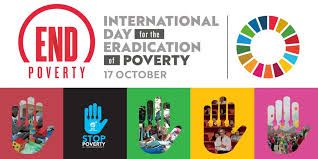Time to implement policies to meet Sustainable Development Goal #1 - No Poverty

International perspective
While the social and living conditions (Human Development Index) of every developing region increased considerably between 1990 and 2015 progress has been slowing since 2010. The most recent United Nations Human Development Report puts a human face on the consequences of these inequality statistics. It notes that:
- one person in nine in the world is hungry;
- eleven children under the age of 5 die every minute;
- on average 24 people are displaced from their home every minute;
- more than 21.3 million people are refugees.
Water scarcity and climate change have added to international tensions. The report estimates that the cost of violence globally is about $1,900 per person.
What can Ireland do to ensure the first Sustainable Development Goal of No Poverty is met globally?
- The Irish Government should renew its commitment to meet the United Nations target of contributing 0.7 per cent of GNI* to Overseas Development Assistance by 2025 and set a clear pathway to achieve this.
- Take a far more proactive stance at government level on ensuring that Irish and EU policies towards countries in the Global South are just.
- Ireland should play a prominent role in the support and implementation of the Sustainable Development Goals. In particular it should work with other Governments to end the race to the bottom on corporate tax rates.
- Continue to support the international campaign for the liberation of the poorest nations from the burden of the backlog of unpayable debt and take steps to ensure that further progress is made on this issue.
To read more of Social Justice Ireland's proposals on implementing the Sustainable Development Goals read our Social Justice Matters chapter on The Global South.
Ireland
High rates of poverty and income inequality have been the norm in Irish society for some time. In Ireland today 780,000 people are living in poverty, a quarter of a million of whom are children and over 100,000 of whom have a job. They are problems that require greater attention than they currently receive, but tackling these problems effectively is a multifaceted task.
It requires action on many fronts, ranging from healthcare and education to accommodation and employment.
However, the most important requirement in tackling poverty is the provision of sufficient income to enable people to live life with dignity. No anti-poverty strategy can possibly be successful without an effective approach to addressing low incomes.
To read more of Social Justice Ireland's proposals for a fairer distribution of income read our Social Justice Matters chapter on Income Distribution.